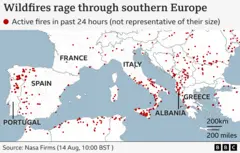The European Union dispatched two firefighting planes to Spain to combat severe wildfires, responding to the country’s activation of the EU’s disaster assistance mechanism for the first time. This aid follows the third wildfire-related fatality reported on Thursday morning. There are concerns about the fires’ potential spread, as Spain’s weather agency Aemet predicts a continuing heatwave until Monday, with some regions experiencing temperatures as high as 44C and moderate winds. Spain is the fifth European country to seek help for wildfire control. In Greece, about 25,000 acres have burned since Tuesday.
On Thursday, two French Canadair water bomber planes arrived in Spain’s northwestern Galicia region. “The fight against fires knows no borders,” stated Pedro Blanco, the regional government representative, emphasizing the international effort to extinguish the fires. Interior Minister Fernando Grande-Marlaska told local media that the planes weren’t immediately needed but were brought to Spain for potential use when necessary. He didn’t dismiss the possibility of requesting additional firefighters.
Tragically, a volunteer firefighter died in a hospital in León on Thursday due to severe burns, becoming the second volunteer and third overall casualty from the fires. Prime Minister Pedro Sanchez expressed condolences, stating, “We are struck once again by the death of a second volunteer who has lost their life in León. All our love and support go out to their family and friends during this unbearable time.”
The Civil Guard arrested two men suspected of starting fires in Castille and León, which spread across thousands of hectares, adding to the 10 arson arrests since June. Ideal weather conditions for wildfires also pose risks due to barbecues, cigarette stubs, or discarded bottles. Starting a wildfire is a criminal offense in Spain, even accidentally.
Thousands have been evacuated nationally, with 700 people displaced from towns in the southwestern province of Caceres on Wednesday. In Portugal, over 1,900 firefighters are battling four major blazes, one of which in Trancoso has burned approximately 14,000 hectares since Saturday, according to AFP.
Portugal’s government extended a state of alert for its mainland until Sunday. Wildfires are common in southern Europe during summer, but heatwave conditions often worsen their severity. EU data indicates around 629,000 hectares have burned across the bloc since the year’s start, with Spain accounting for about a quarter of that area.
While directly linking climate change to specific extreme events is challenging, scientists assert climate change generally intensifies heatwaves in terms of temperature, duration, and frequency. Prolonged heat can dry out soil and vegetation, facilitating rapid wildfire spread.
Greece, Bulgaria, Montenegro, and Albania have also activated the EU’s civil protection mechanism, enabling disaster-affected countries to request emergency assistance. In Greece, wildfires have persisted for a third day, with significant risks on Chios island and the Achaia region in the Peloponnese.
Ninety-five people, including firefighters and civilians, have been injured, with more than 10,000 hectares burned since Tuesday, according to EU data. Authorities issued a red alert for Thursday over high fire risks in Attica, eastern Central Greece, Evia, northeastern Peloponnese, and Thrace.
In Chios, the fire spans dozens of kilometers, necessitating the evacuation of numerous residents via sea with coastguard and private vessels. Authorities reported detaining three men for a fire near Patras, which persists in parts. Fires have also surged in Albania and Turkey, resulting in injuries among firefighters.
Additional reporting by Nikos Papanikolaou in Greece.

